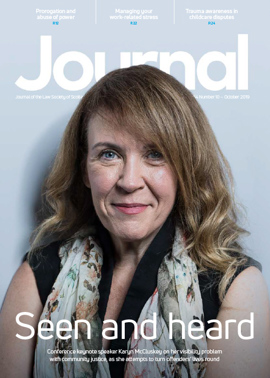Must try ardour
I telephoned my local garden centre the other day. “Good morning”, oozed a voice dripping with bonhomie. “How can I make you smile today?” I almost replied that the best way would be for him to hang up. But I was being too cynical. This cheery fellow was trying (I give him the benefit of the doubt) to treat me like a human being, not a disembodied source of revenue. We could learn a lot from him.
The great David Maister once asked this question: are your relationships with your clients more like a romance, or a one night stand? Does your interest in them last for precisely the time it takes to do the job and issue the largest possible fee note or, like my friend in the garden centre, do you nurture for the long term?
Taking a transactional view is easier. You have the expertise; they have the need. There is no requirement for you to be friends. You just need to fulfil your respective obligations. Every second you spend is chargeable; there is none of that pesky wasted time getting to know them and their world. In fact, you may think, a transactional relationship suits them as much as you. They just want a job done. If they want a relationship, they’ll go on a dating site.
Only connect
Yet putting professional detachment on a pedestal has baleful consequences. Show me someone who does not have a need to connect, and I’ll show you a sociopath. Clients really notice when their advisers make it clear that the relationship is strictly business, and show no interest in going even the extra centimetre. They feel shortchanged by it. In survey after survey, general counsel bemoan this attitude, and condemn it as shortsighted. It encourages clients to be adversarial with their advisers, the opposite of what they should be. In a healthy professional relationship, caveat emptor should have no place.
We interact with our clients at some of the most important moments in their business and private lives. The quality of our advice will always be the most important factor, but clients want empathy too, a feeling that there is a relationship not entirely dictated by a pound sign. It is very much in our interest that they do not perceive us as only takers.
A little while ago, I conducted a series of key client interviews for a Scottish magic circle firm. One client gave more of its business to a competitor, and I asked them why, when there was little or no difference in the relative quality of advice. “The other firm,” explained this client, “spends very large amounts of non-chargeable time discussing what a world-class service looks like to us, how they can better understand us and our business. For as long as they do that, we will be strongly committed to them.”
Here are the benefits of romance: loyalty, trust, mutual commitment for the long term, defence against competitors, and probably less price resistance. As Maister says, many client relationship plans are nothing of the kind. They are sales plans, designed to win business and generate cash. The defining characteristic of a valuable relationship is that both sides give as well as take. Indeed, successful rainmakers prove time and again that the more they give, the more comes back to them. Too many law firms, especially larger firms, do not get this, which is why there has been a trend in some quarters towards instructing smaller firms who offer a service more personal and generous in spirit.
Scourge of the timesheet
The enemy of relationship-building is slavish adherence to chargeable time. If you’re addicted to instant gratification, and unwilling to commit a second of your day except for reward, your chances of building a successful career based on a network of valuable relationships are nil. If you are technically sound, you may find a niche, but you will forever be dependent on others to keep you fed. This is a perilous place to be.
Law firm leaders have a responsibility to establish a culture in which “romantics” flourish, giving them permission to spend the time necessary, and encouraging their efforts. They are entitled to insist that these efforts are thoughtful and considered, but equally, they must accept that not all of them will pay off.
The defining emotion of the one-night stand is regret. It’s as true in this context as in our private lives. It’s too late to lavish more attention once an erstwhile client, having no particular reason to be loyal, runs off to the arms of another. Be a romantic. It may be more effortful and expensive, but there is a far greater chance that you will still be loved in the morning – and for all the mornings to come.
Regulars
Features
Briefings
- Law fair for the high street
- It's time for home truths
- No hope at age 16?
- Drug driving
- Licensing and the public health objective
- Constructing the new framework
- Scottish Solicitors' Disipline Tribunal
- Calling-up: the questions continue
- Reverse charge: don't sit back
- The anomaly that is immigration bail







